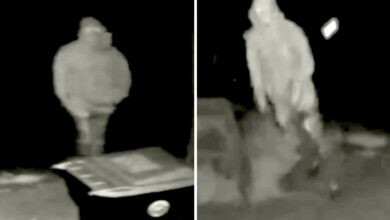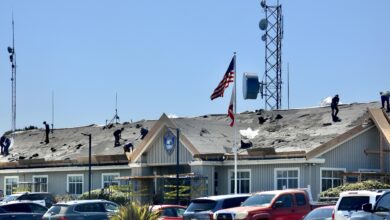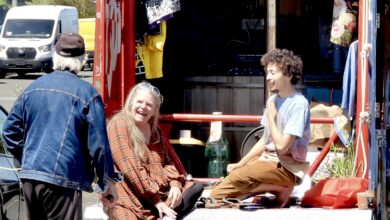Former gang member: Fight gangs with art, not handcuffs
Remember all those gang summits and truces in cities where smiling gang members posed with rivals, cops and community leaders?
And whatever became of all those police crackdowns and zero-tolerance policies for red or blue clothes that were supposed to stop gang problems?
Noted author and former Los Angeles gang member Luis Rodriguez pointed the finger of blame for the long-term failure of these efforts, but not at gang members or cops.
“Believe it or not, these gang members really were ready to quit,” Rodriguez said. “What failed was the community support. The jobs didn”t show up, the services weren”t happening.”
Rodriguez said communities should fight gangs with art, education and respect, not just by restricting and punishing gang members.
“We can stop gang violence in this country, but not the way we are doing it … We cannot arrest our way out of this. We need what I call a whole community approach,” said Rodriguez.
Fort Bragg Police Chief Mark Puthuff said he was encouraged by Rodriguez”s message.
“I know that we will never be able to arrest our way out of problems, but by offering proactive solutions and increasing community awareness, we can make a difference,” Puthuff said.
Fort Bragg Police, the Mendocino County Sheriff”s Department and Safe Passage Family Resource Center were among the sponsors of an event last Friday at Cotton Auditorium.
“I appreciate the Fort Bragg community,” Puthuff said, “because I have never felt that they expect the police department to solve all of the problems” by ourselves. It has been and will remain a collaborative approach” involving the entire community.”
The Rodriguez address was offered as part of the Mendocino Coast Writers Conference. Rodriguez has published 14 books in memoir, fiction, nonfiction, children”s literature and poetry, winning many literary and humanitarian awards. He is best known for his controversial 1993 memoir of gang life, “Always Running: La Vida Loca, Gang Days in L.A.”
His message suggests the community take responsibility for gang members, rather than isolating them and letting cops deal with the problem.
Rodriguez tied gang activity to “empties” in the hearts of young, vulnerable people and in the hearts and programs of the community.
“Gangs will fill a vacuum .?[Prospective gang members] are trying to gain power. They don”t know the gang doesn”t really give them any power, but it looks like it does, and that”s why they go there,” said Rodriguez.
He relayed horrifying highlights of his own life story, such as breaking into his school with another boy when he was 10. His friend fell to his death through a skylight while police pursued.
When he was 12, he took up drugs including heroin. At 15 his mother kicked him out of the house and he was “jumped in” to the inner circle of his gang, the Lomas Locos. After the traditional beating by fellow gang members, he earned his status through a brutal attack on a man with a rusty screwdriver. He avoided an attempted murder trial later when he and the “homies” intimidated witnesses.
At 18, he had dodged bullets, knives and felony charges while 25 of his friends were dead and many more were in prison.
While in jail, he was mentored and made the decision to drive his anger and energy in a new direction — into being a Chicano and urban peace activist.
He chaffs when people say God was on his side.
“Why wasn”t God on the side of those others? I wasn”t the best of them,” he said.
He said when a community invests its time, gang members can fill their empties by finding their family, cultural and spiritual roots. While Rodriguez emphasized the need for a spiritual connection, he is no Nicky Cruz, the former New York City gang member whose best selling book, “The Cross and The Switchblade,” advocated born-again Christianity as the salvation from gang life.
Rodriguez has seen that approach work along with his sweat lodge, but has also seen Buddhism, Catholicism and other belief systems work. His way out was connecting to his Mayan Native American roots and Chicano activism.
“We don”t try to impose a belief system. We just try to get them to find a spiritual life,” he said.
Rodriguez has been featured in many media accounts for interesting gang members in good books, music and artistic expression. He is co-founder of Tia Chucha”s Centro Cultural — a bookstore, performance space and workshop center in the Northeast San Fernando Valley. When he opened his store, a huge, traditionally Mexican section of the San Fernando Valley had no bookstores, art galleries or movie theaters.
“People came into the art gallery who had never seen art. They wanted to buy the frames,” Rodriguez said.
Now, people have come to depend on art, and they hunger for more.
“It”s essential, the arts, you can”t cut this money off when times get hard,” Rodriguez said.
Art classes featuring heavily tattooed former and current gang members sometimes scare other art patrons.
“I tell them, they are not here to do gang things, they are here to do beautiful art … These are the kids that don”t fit in the boxes. They can be very creative,” Rodriguez said.
He teaches gang members to find a cause and an artistic outlet, which often can channel passion into being an auto mechanic or teacher.
“Being a great dad can be your cause, a great cause,” he said.
Rodriguez is surprised that he still sees so many adults who talk down to kids and treat kids with disrespect, even in schools. He said the respect and roots must start at home, a point Puthuff thinks is vital.
“I do think the deterioration of the family” is a large contributor to gang issues,” Puthuff said. “Luis touched on this, but I think it is critically important that the sense of family, core values, and traditions are re-ignited by parents. The sense of family and belonging is often replaced by the gangs, as Luis discussed.”
Rodriguez quit all drugs when he began his career as an activist but did not quit drinking until 16 years ago. His oldest son joined a gang and ended up in prison. He feels responsible and has spent a lifetime learning to be present and take responsibility,
He said his own father was physically present, but simply wasn”t there. His father was sent to the Mendocino Coast in the 1950s so he could escape gang violence.
For the past 14 years, Rodriquez has made that trek to be a leader of the Mosaic Multicultural Foundation”s Men”s Conferences. He works with Mosaic founder Michael Meade, healer Orland Bishop and American Buddhist Jack Kornfield in helping men be strong without violence.
Rodriguez believes strong-arm tactics fail, especially if not accompanied by proactive solutions.
He gave the example of gang injunctions in violence-torn Los Angeles neighborhoods that made long lists of gang members and arrested people for gathering with other people on the list and prohibited many activities by those identified as gang members.
He said this effort to squeeze the gangs just caused them to spread all over the country. Rodriguez said he has seen Los Angeles gang members working the streets in Delaware, Iowa and Central American countries.
“They spread the problem to the whole country and the world and didn”t solve the problem in Los Angles either,” he said.
One of those places is Fort Bragg, where he said gangs are starting to come in.
“In this community, you have a chance to nip it in the bud. You have the police department, the schools, the whole community at work. This is not LA, but it doesn”t matter. If there enough empties, the gangs will fill them. Fill those empties.”
He said the war on drugs has accomplished nothing in stopping drugs.
“You are not going to make people stop taking poison. You can only make them not want the poison,” he said.
Rodriguez thinks programs like zero tolerance send the wrong message, further isolating students who need help the most.
Chief Puthuff thinks there is a time to practice zero tolerance.
“I disagree somewhat on the zero tolerance” discussion in regard to gangs. We have a zero tolerance” on any predatory violence that occurs in our community. The difference is that we have a heavy investment in the prevention and education approaches as a first line of defense, but a zero tolerance enforcement (arrest) strategy for predatory violence in the community,” Puthuff said.
Fort Bragg police count their school resource officer as a key proactive step in heading off gang activity. Key to that effort is the GRIP Program (Gang Resistance is Paramount) in our schools.
“The initial target group was fifth grade students and also second grade,” Puthuff said. “The idea is to proactively invest in our young impressionable youth. In addition, we work closely with a variety of groups that provide activities to our youth that build upon their self-esteem, provide them with skills, and teach things like cooking and art.”
“As a department we are a group of mentors, teachers, coaches, and protectors who are committed to preserving a quality of life that we can be proud of,” Puthuff added. “We have a philosophy that is built on service, and we aren”t here to police the community — we as the police are part of the community.”
Rodriquez”s 30 years of urban peace and gang intervention work was utilized in the development of the Community-based Gang Intervention Model, with other LA gang peace advocates and interventionists, which the LA City Council approved in February 2008, and is now sent across the country to assist other cities and communities. That manual is available for free through the City of Los Angeles.
Rodriguez”s Cotton Auditorium speech was filmed and will air for the first time on Friday, Aug. 14. at 7 p.m. on MCTV Cable channel 3.
Alex Rodriguez, 18, was one of about a dozen younger people in the audience.
“The speech was good, it has a lot of effect when it comes from somebody like him who has really been there,” he said.
The teenager said parents and the community would do well to consider Luis”s words about speaking with respect and setting the example.
“Look at all this greed. You don”t think this has an effect on young people?” Alex Rodriguez said.




